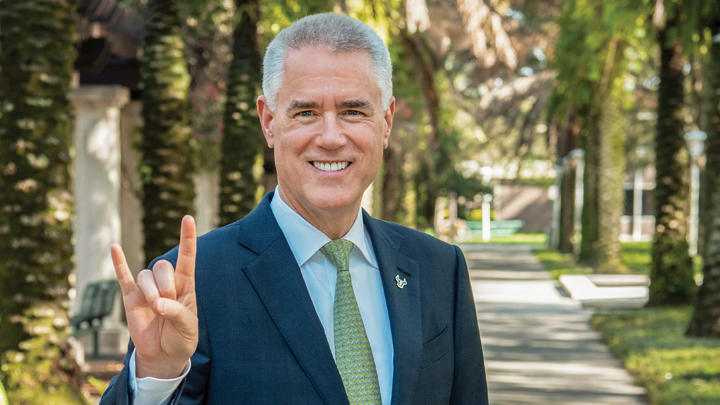Currall retiring as USF president

USF President Steven Currall announced in a universitywide email Monday morning that he is retiring as university president, effective Aug. 2, but will remain as a faculty member in the Muma College of Business.
“The decision was not made lightly,” Currall said. “On a personal level, the demands of the president’s role are immense. The intensity of the past two years has put a strain on my health and my family. Therefore, after thoughtful reflection, I have decided to retire from the USF presidency to ensure that I preserve my health, as well as to spend more time with my wife, Cheyenne, and my 91-year-old father.”
Currall said he informed Will Weatherford, USF Board of Trustees (BOT) chair, and both agreed the change in leadership would take place before the start of the fall semester on Aug. 23.
In a universitywide email Monday morning, Weatherford thanked Currall for his time at USF and the university’s accomplishments during his tenure.
“Though we have only worked together for a short period of time, I have been impressed by his tireless work ethic and passion for the transformative role of higher education,” Weatherford said.
The BOT will name an interim president while searching for a candidate to fill the position permanently, according to Weatherford. In accordance with university protocol, Provost Ralph Wilcox will serve as acting president in the meantime, Weatherford said.
Currall began his career in July 2019, following Judy Genshaft’s 19-year tenure, as the university was preparing plans to consolidate. From the beginning of his term when he moved into the Lifsey House to the end of his term as the 10-year strategic blueprint was finalized, Currall expressed that his primary goals were to elevate research and promote USF to a top 25 research university.
To begin achieving his goals, Currall established the principles of community task force in October 2019. The 16-member task force created a document outlining the principles of community which were revealed in February 2020.
Quickly after tackling consolidation and establishing the principles of community, COVID-19 became prevalent in the U.S. The university ultimately switched to being primarily online, and Currall navigated the second half of his two-year tenure almost completely virtually.
His work online included transitioning most university functions to be entirely online, hosting town halls to field questions from students, faculty and community members as well as postponing four sets of in-person graduation ceremonies until this summer, where students who graduated in 2020 or early 2021 will be able to walk across the stage at a make-up graduation Aug. 21-22.
As Currall was attempting to navigate the uncertainty of the pandemic as well as the beginning stages of consolidation in May 2020, the community faced a movement of a different nature following the death of George Floyd.
Currall appointed Elizabeth Hordge-Freeman to be the senior advisor to the president and provost for diversity and inclusion. The Office of Diversity, Equity and Equal Opportunity received backing from the president in its efforts to host round tables and hear the voices of Black students, the Black Student Union, and the Black Employee Steering Commitee at USF.
Ranking No. 1 against all other state universities, USF was named the leader in performance-based funding metrics in 2020, a point of pride for Currall as advancing the university in rankings and research was always his goal.
USF also placed in the top 50 public universities of the U.S News and World Report’s rankings in September 2019 and 2020 at No. 44 and No. 46, respectively, under Currall’s leadership following its No. 58 ranking in 2018.
Despite the rankings, in his second year Currall also faced a budget crisis due to the effects of COVID-19. This initially led to the administrative announcement in October 2020 that all undergraduate programs held within the College of Education would be cut.
Other departments, faculty and staff faced budget cuts as well, with Currall himself taking a 15% salary cut. Faculty were largely kept in the dark about the future of the proposed $36.7 million budget reduction plan which led to an atmosphere of uncertainty surrounding the university between the fall and spring semesters.
The College of Education cut was ultimately denied, but other areas of the university will still be cut or reduced.
One of his final acts as president consisted of overseeing the completion of USF’s 10-year strategic bluprint outlining seven areas of focus which will guide the university forward in the years to come.
Currall praised the USF community and emphasized his continuing dedication to the university as a whole as he steps down from the presidency and takes on a new faculty position within the Muma College of Business.
“I wish to thank each of you again for the extraordinary honor of serving as USF president,” Currall said. “I remain committed to advancing the mission of this wonderful university and to advancing overall prosperity and opportunity in the Tampa Bay region.”







